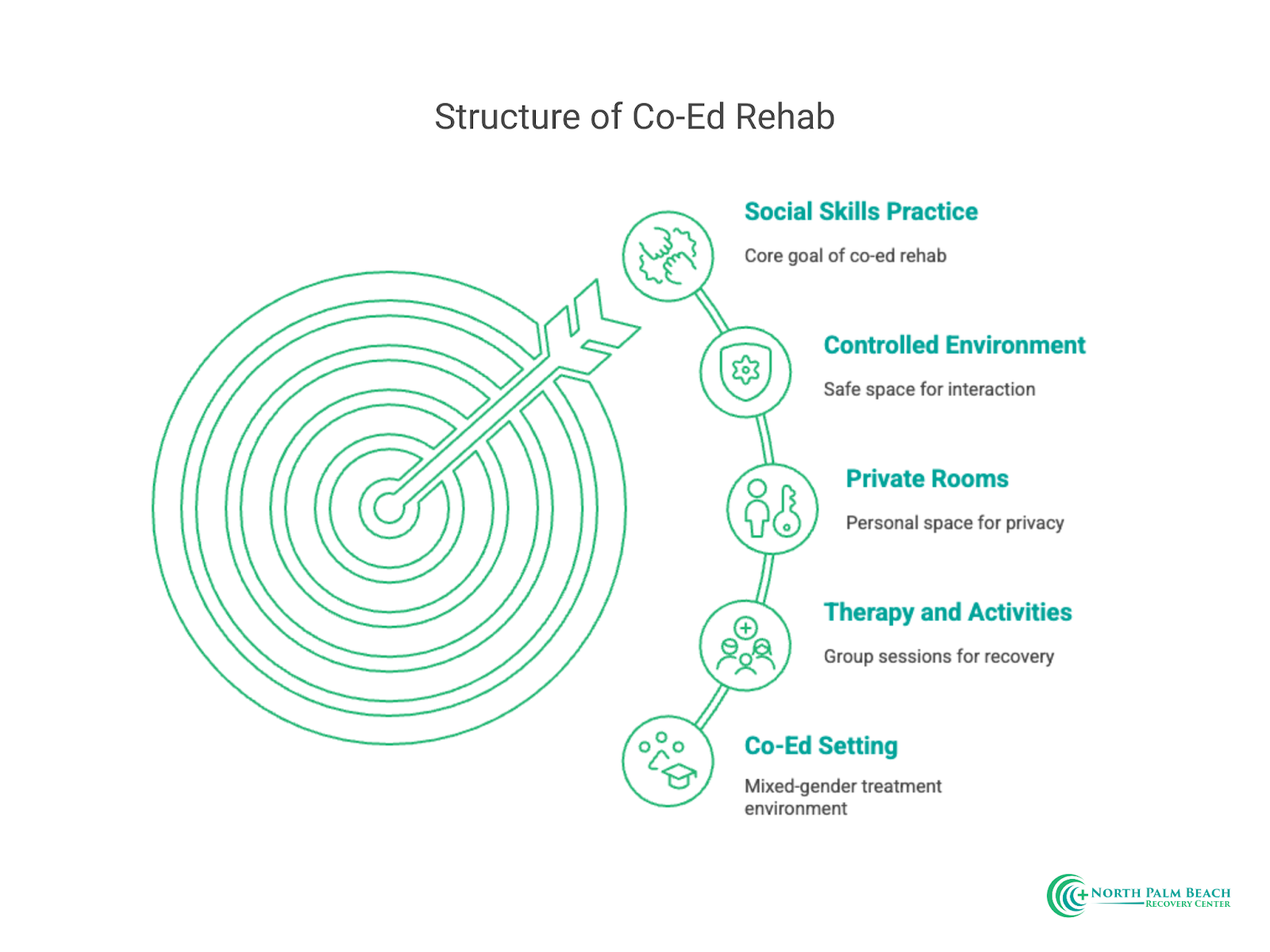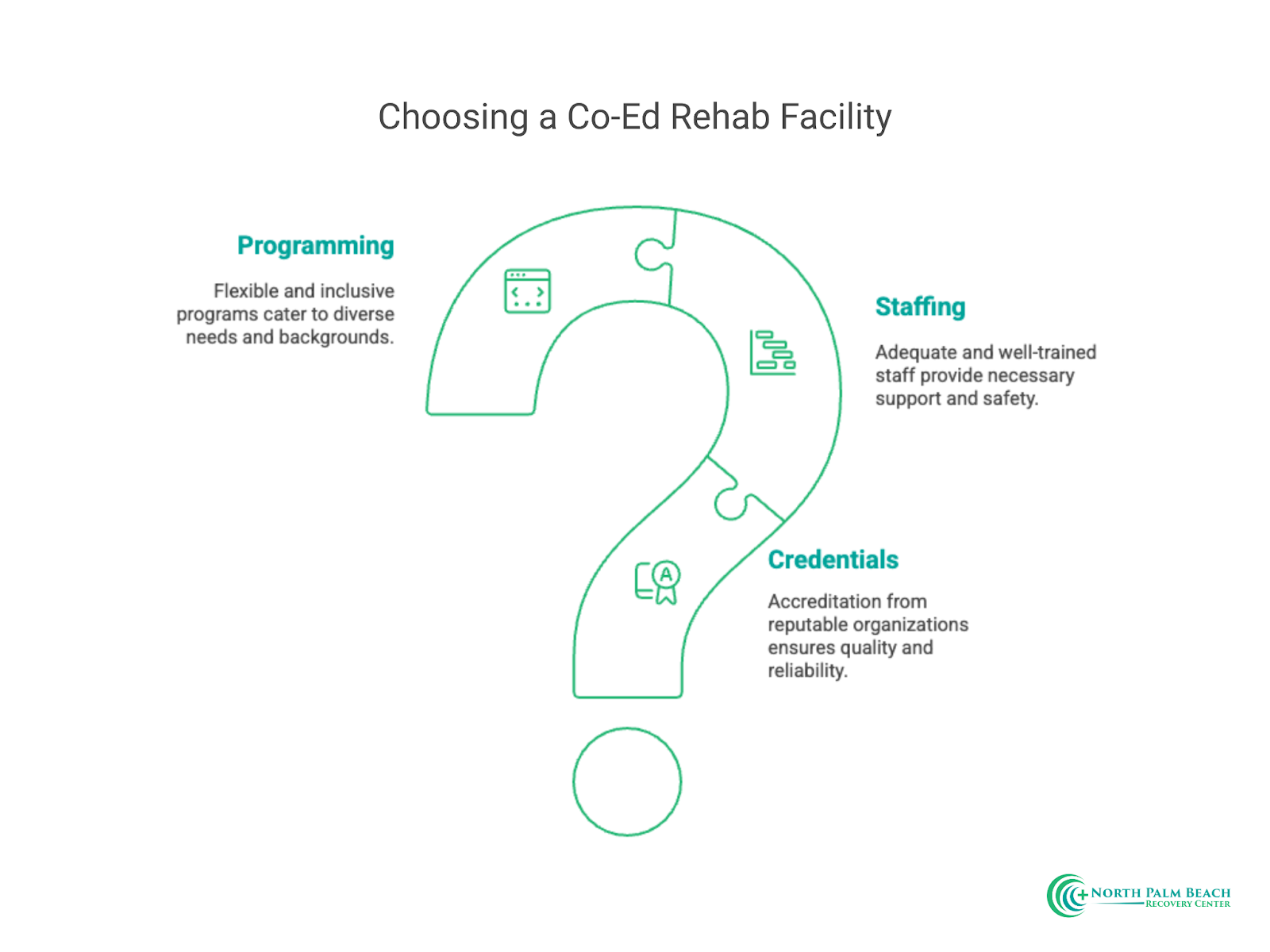
So you need addiction treatment, and you're trying to figure out if co-ed rehab is the way to go, or if you should stick with a single-gender program. You're definitely not alone in feeling confused about this. Most treatment places now do co-ed (like 68% of them), but that doesn't mean it's automatically right for everyone. Here's the thing: where you go for treatment actually matters a lot. It affects how comfortable you feel in therapy, what kind of coping skills you pick up, and honestly, whether you stay sober long-term.
This guide will break down what co-ed rehab is really like and help you figure out if it makes sense for your situation.
Let's clear up the confusion about co-ed rehab. Most people think they know what it means, but there are some big misconceptions about how these programs actually work.
Co-ed rehab means everyone gets treatment in the same place, regardless of gender. But don't worry, you're not all bunking together. You hang out during the day for therapy, classes, meals, and activities, but everyone goes back to their own private rooms at night.

It's kind of like work. You deal with all kinds of people during the day, then go home to your own space. The whole point is getting you ready for actual life, where you can't just avoid half the population forever.
This setup has gotten pretty popular lately because it actually works. You get to practice real social skills in a controlled environment where there are counselors around if things get weird or complicated. Way better than being thrown into the deep end later with no backup.
Single-gender programs keep men and women completely apart. Every therapy session, meal, and activity is just with your own gender. Some people really need this, especially when talking about trauma, body image stuff, or triggers that are tied to gender. Co-ed mixes everyone together during the day. You're hearing how different people tackle the same problems. Like when you're talking about relationship boundaries, you actually get to hear how both men and women think about communication. It gives everyone way more to work with.
The whole daily setup is different, too. Instead of having separate dining rooms and game areas, co-ed places have shared spaces where everyone hangs out together, with staff watching. You might end up playing volleyball on mixed teams or doing art therapy, where hearing different viewpoints actually makes the whole thing more interesting and useful.
Co-ed treatment offers real advantages that can make your recovery stronger and more lasting. Here's why many people find mixed-gender programs more effective.
Real life has everyone in it. Your job, family stuff, going out with friends - it's all mixed genders. Co-ed rehab actually prepares you for that instead of keeping you in some protective bubble. You get to practice setting boundaries with all kinds of people, not just your own gender. In a group, you're learning how to speak up for yourself, deal with conflict, and keep your emotions in check while dealing with totally different personalities and backgrounds. These skills become huge when you're back in the real world, trying not to drink or use over every social drama.
The best part? You're allowed to screw up and learn from it while there are counselors around to help you figure it out. Way better than getting out of treatment and having to learn healthy relationship stuff the hard way when you're on your own. Most people who do co-ed programs end up feeling way more confident about handling social situations.
Here's what's interesting: men and women usually deal with stress totally differently. In group therapy, you get to see both ways of handling things. Maybe the women share techniques for managing emotions that you never thought of, while the guys offer different approaches to work stress or family drama.
This naturally breaks down a lot of stereotypes. When some tough guy opens up about his depression and shows real vulnerability, it proves that mental health issues aren't about being weak. When women talk about career pressure or juggling family stuff, everyone realizes addiction affects people for way more reasons than they thought. The end result? You stop feeling so alone and weird. You start seeing that other people, no matter their gender, are dealing with similar crap and working toward similar goals. That "oh, I'm not the only one" moment really speeds up your healing process.
Co-ed programs basically double your support network. You're not just making friends with people like you, but building relationships with everyone. And these friendships often stick around long after you leave treatment. Having friends of different genders means you get different takes on your problems later. Relationship drama, work stress, family stuff - your mixed support group can give you way more angles and advice than if everyone thinks the same way.
Co-ed also stops that echo chamber thing that can happen in single-gender groups. You know, where everyone just agrees with each other and reinforces the same ideas. With different voices in the mix, conversations stay more real and balanced. You get better group dynamics and actually useful support instead of just people nodding along.
Co-ed rehab isn't perfect. Here are the real challenges you should know about before making your decision.
Look, people hook up in treatment. It happens. When you're emotionally raw and vulnerable, it's easy to mistake intensity for love or think someone really "gets you." The problem is, these relationships usually crash and burn, taking your recovery with them. Decent facilities know this and have actual rules about it. No romantic relationships, period. Staff should be trained to see when people are getting too close and step in before it becomes a problem. If you're catching feelings, they should offer individual counseling to help you work through it.
Here's what to ask upfront: What's your policy on relationships between clients? What happens if people break the rules? If they give you some wishy-washy answer or act like it's not a big deal, run. Good programs know this stuff is messy and have real plans for dealing with it, not just crossed fingers and hope.
If you're dealing with sexual assault or domestic violence trauma, co-ed settings can feel really unsafe at first. Just being around the gender tied to your trauma might trigger anxiety, make you constantly on edge, or make you want to skip group stuff entirely.
Good programs get this. They'll dig into your trauma history during intake and maybe start you off in single-gender groups first. Then they slowly work you into mixed settings when you're ready. Some people actually do better starting with single-gender treatment and moving to co-ed later, once they've got better tools to handle things. Don't push yourself into a co-ed just because you think you should. A decent clinical team will honestly assess if you're ready for mixed groups and give you other options if you're not. Your safety and comfort come first.
Sometimes, one gender totally takes over group discussions while everyone else just sits there. That kind of defeats the whole point of getting different perspectives, and it makes people feel pretty left out.
Good facilitators actually do something about this. They'll structure discussions differently, make sure everyone gets a turn to talk, or break into smaller groups when things get lopsided. The best ones have real training in keeping things balanced, not just hoping it works out.
When you visit a place, pay attention to how groups actually work:
If you see obvious problems and nobody's doing anything about it, that's your cue to keep looking.
Figuring out if co-ed rehab is right for you requires honest self-reflection and professional guidance. Your success depends on choosing an environment that matches your specific needs and recovery stage.
Co-ed usually works pretty well if your addiction isn't super severe and you don't have a bunch of other mental health stuff going on. If you're generally okay around different genders and want practice for real life, co-ed could be your thing.
But if you've got serious trauma, major mental health issues, or bad experiences in mixed settings before, single-gender might be smarter, at least to start. The type of addiction counts too. If whatever you're using makes you really impulsive or messes with your judgment big time, you might need the quieter vibe of single-gender first. How comfortable you are with mixed groups is huge. Some people just feel safer opening up around their own gender. Others get more out of hearing different viewpoints. It usually comes down to your history, where you grew up, and just how you're wired as a person.
LGBTQ+ folks often have better luck with co-ed programs than places with strict gender rules, but don't count on it. You need to ask the hard questions upfront: How do they handle gender identity? Will they use your pronouns? Where will you actually sleep? Has their staff been trained on LGBTQ+ stuff, or are they just winging it?
Here's the thing: co-ed doesn't automatically mean they're cool with everyone. Plenty of places will say all the right words about acceptance, but then have zero actual policies or training to back it up. Look for facilities that can show you their non-discrimination policies and where the staff actually knows what they're talking about, not just places that mean well.
Your past treatment experiences are probably your best guide. If you felt stuck or lonely in single-gender programs before, co-ed might give you more energy this time. But if mixed settings made you uncomfortable or distracted, maybe stick with single-gender for now. Think about work and social stuff too. Are you the person who speaks up more in mixed meetings, or do you feel safer in same-gender groups? How you act in other situations usually carries over to treatment.
Be real with yourself and your counselor about where you actually open up. Some people need that same-gender safety net to share the deep stuff. Others get motivated by hearing different perspectives. There's no right or wrong here, just what works for you. Your recovery depends on finding that sweet spot.
Finding a quality co-ed treatment facility takes research, but knowing what to look for makes the process easier. The right program balances clinical excellence with smart policies that keep mixed-gender environments safe and effective.

Check the credentials first. If they've got accreditation from The Joint Commission or CARF, that's a good sign they're not just winging it. Make sure they have actual licensed counselors, social workers, and medical staff who get how co-ed treatment works, not just people who figured it out last week.
Watch the staffing situation. Are there enough people around during mixed activities? Do they have clear plans for when things go sideways? You want 24/7 clinical coverage, a real schedule (not just "figure it out as you go"), and actual written policies about boundaries and behavior.
The programming matters too. Good places give you options. Sometimes you need mixed groups, sometimes you don't. They should know how to handle trauma properly and have groups for gender-specific stuff when you need it. And honestly, if they don't seem comfortable with people from different backgrounds, that's probably not your place.
Don't hold back on the tough questions. Start with the basics:
Ask about trauma stuff too.
If they're rigid about their approach, that's a red flag.
Don't forget the boring but important stuff:
Pay attention to how they answer these questions. Good places will give you straight answers and seem happy you're asking. If they get defensive or give you runaround answers, that tells you everything you need to know. Keep looking.
Look, there's no "right" answer here. Co-ed versus single-gender is about what works for you. Your past experiences, trauma history, and comfort level matter way more than what worked for someone else. No approach works for everyone. The best program is just the one that fits your situation. Visit places, ask hard questions, and trust your gut about which environment feels right for your recovery. Whether you pick co-ed or single-gender, the big thing is getting professional help and actually committing to it. Your recovery is unique, and finding the right setting matters for long-term success. If you're thinking about co-ed rehab and want to talk through whether mixed-gender treatment makes sense for you, North Palm Beach Recovery Center offers personalized consultations. Our team can help you figure out your options and create a treatment plan that works for your specific situation. Call us today to learn about our programs and take your next step.
Lorem ipsum dolor sit amet consectetur adipiscing eli mattis sit phasellus mollis sit aliquam sit nullam neque ultrices.